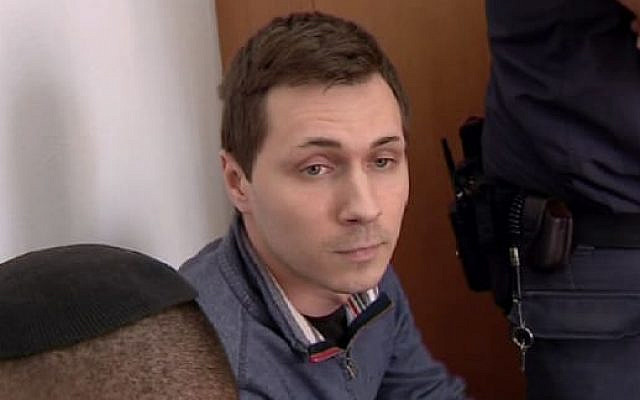
Israeli officials believe Moscow is trying to stop extradition of Aleksey Burkov to the US by jailing Naama Issachar, but he says ‘Russians never leave Russians behind’
Israeli officials’ growing conviction that a young Israeli woman caught with 10 grams of pot in Russia is being held as part of a pressure campaign to bring about the release of a Russian hacker held by Israel, has given rise to the question of why Moscow would be so interested in the fate of Aleksey Burkov.
Burkov, an IT specialist who was arrested in Israel in 2015 at the request of Interpol, is wanted in the US on embezzlement charges in a massive credit card scheme that saw him allegedly steal millions of dollars from American consumers.
His extradition to the US was approved by the Supreme Court in August, but Russia, too, has made an extradition request, and Moscow officials have repeatedly pressed Israel to send him home.
Recent days have seen reports in the Hebrew media that Israeli officials believe Burkov may be tied to Russian intelligence. Channel 13 news on Sunday also reported that this was the prevailing assessment in Israel, though it did not provide a source for the claim. It said Burkov could be tied to Russia’s efforts to influence the American election process.
But Burkov, in an interview with Channel 13, denied any such involvement.
“It’s all a conspiracy,” he said. “I have nothing to do with it. I’m not a spy. I didn’t interfere in US elections, Israeli authorities know this.
“I’ve never been in touch with the Russian government or intelligence services,” he added. “I have nothing to do with them, I never worked for them and I had no personal ties to them.”
Asked why Russia appeared so intent to secure his return, Burkov answered that “Russians never leave Russians behind, and that’s why they’re fighting for me. I want to believe Israel doesn’t leave its citizens behind either.”
Naama Issachar, 26, was arrested in Moscow in April while returning from a trip to India. A small quantity of marijuana, around 10 grams, was sniffed out by police dogs as her suitcase was being transferred by airport staff to her connecting flight from Moscow to Tel Aviv. She was sentenced on Friday to seven and a half years in prison for alleged drug smuggling, though she would not have had access to the illicit substances before arriving back in Israel.
Russian prosecutors said that because Issachar’s bag entered Russian airspace with the drugs inside it, her actions should be considered smuggling despite the fact she never intended to enter Russia.
Issachar’s lawyer is to lodge an appeal next week against the jail term, but the prospect of its success is regarded as remote.
On Sunday, the Kan public broadcaster reported that a short while after Burkov’s extradition was green-lighted by the Supreme Court, Issachar’s detention privileges were significantly curtailed — indicating that while she hadn’t originally been arrested as a bargaining chip, she had become one later.
The assessment in Jerusalem is that Issachar’s trial was politically motivated and a tit-for-tat move by Moscow to compel Israel to accept an exchange deal for Burkov. Russia has reportedly offered a prisoner swap between the two, which Israel has turned down.
Burkov on Sunday expressed his support for “Issachar and her family. My family has been in the same exact situation for the past four years. Naama and I are being held in prison due to political games.”
He said he hoped a prisoner swap would move forward. “I call on our countries, and Israel first and foremost, not to play political games and to carry out a humanitarian prisoner exchange.”

Burkov previously told RT (Russia Today), a Russian television network funded by the government and widely considered its propaganda outlet, that he was an “average man,” an IT freelancer from St. Petersburg who was on holiday with his girlfriend in Israel “when his life was turned upside down.” He claimed that he was “hijacked” and taken into custody as part of “a standard US scheme.”
The Israeli Foreign Ministry has summoned the Russian ambassador to Israel in recent days to express Jerusalem’s deep dismay at Russia’s handling of the matter, Israel’s Channel 12 news reported Sunday. Justice Minister Amir Ohana has publicly branded the jail term handed down to Issachar “not proportionate, not logical, and not appropriate.”
A senior diplomatic source on Sunday said that as long as Russia is trying to bring about an exchange deal, “Israelis should think twice about traveling to Russia.”
The warning against traveling to Russia came as President Reuven Rivlin sent a plea for “mercy” to Putin, seeking a pardon for Issachar.
Prime Minister Benjamin Netanyahu has cultivated close ties to Putin, flying frequently to meet with him. But his appeal to Putin last week for leniency in Issachar’s sentence appeared to have been unhelpful.
Issachar’s mother, Yaffa, on Sunday published an open letter in Hebrew and Russian addressed to Putin, carried by the Yedioth Ahronoth daily, in which she expressed hope that he would make the decision to release her daughter in the coming days.
Netanyahu on Saturday told Yaffa Issachar that he was “doing everything” to secure her daughter’s release. According to Channel 12 news, Netanyahu called Yaffa and told her to keep her daughter’s spirits up. Meanwhile, Yaffa told the prime minister she believed Naama could be freed “in days” if Israel acted right.
